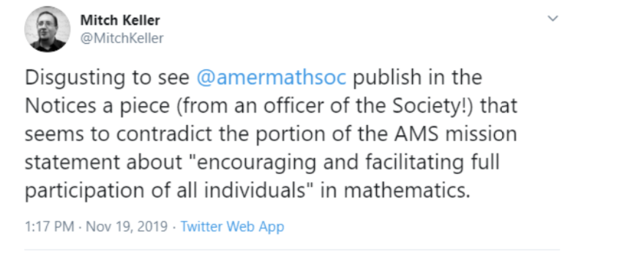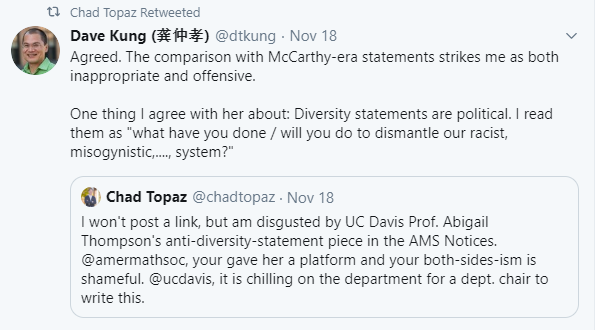Politics
Required Diversity Statements as Ideological Loyalty Oaths
A math professor was targeted by an academic outrage mob for objecting.
Posted November 21, 2019 Reviewed by Ekua Hagan
Recently, the VP of the American Mathematical Society (AMS) posted an essay arguing that the implementation of policies requiring applicants for faculty positions to submit Diversity Statements constitutes a method for screening candidates based on their politics.
This is just the most recent in a rising tide of intolerant academic outrage mobs. I've written about this problem for Psychology Today and AreoMagazine.
To be sure, these essays are not intended as a general indictment of the liberal or reasonable left, nor are they a vindication of views one sometimes finds on the right (especially, the extreme right), including but not restricted to white supremacy and ethnonationalism. My point is not about politics or ideology at all. It is about intolerance and the willingness to attempt to punish and sanction people for expressing views with which one disagrees or opposes.
Here are some examples of how she was denounced on Twitter by her colleagues.


This essay (which is really a compilation of a long Twitter thread), provides lots of detail, including resources and links, to petitions and essays both denouncing and supporting her.
Here is the letter I sent in support of her:
To the American Mathematical Society,
I endorse Abigail's statement that appeared in Volume 66, #11 of Notices of the American Mathematical Society. Even if I did not endorse it, I would strongly endorse her right to publish something with which I disagreed, without fear of punishment triggered by protests or outrage mobs, including outrage mobs of academics.
Although I am speaking entirely for myself, I have held several major administration positions at Rutgers University. Through these positions, I have had more than ample opportunity to initiate practices that advance diversity.
For example, I initiated a practice whereby a departmental dversity committee plays a proactive role in faculty hiring by assisting all search committees. We also recently submitted a proposal to our administration to create a new postdoctoral position in order to facilitate creating a pipeline of scholars who will advance the diversity of the faculty here and elsewhere.
I say this to communicate to you that this is not some thinly veiled attempt to oppose diversity efforts. Far from it. Regardless, Thompson's essay is an eloquent description of how, whether intentional or not, implementation of required Diversity Statements at universities constitutes a political litmus test for hiring. Universities should not be in the business of requiring applicants to meet political litmus tests.
Perhaps Thompson is wrong in believing this. Perhaps I am wrong, as well, for agreeing with her view. Even if that is the case, academia is the last place on Earth where someone should be sanctioned or punished for expressing objections to policies and practices on any grounds, including but not restricted to political ones.
Sincerely,
Lee Jussim
Distinguished Professor
Rutgers Psychology
I have a sincere Diversity Statement that I chose to put online at Rutgers, which you can find here. I am pretty sure I was the first Rutgers Psych Professor to have such a statement. This was by my choice; no one urged or pressured me to do it. Rutgers has a very demographically diverse student body, and it is genuinely important to me that students know that, regardless of their racial, ethnic, political, religious, or other identity backgrounds, they are welcome here and in my lab.
However, I also respect faculty who would rather not provide a diversity statement. People who strive for excellence in their field of expertise, say, teaching and research for many academics, should not be excluded from positions because they are not sufficiently fluent in the lingo of social justice.
I also have one here, in which I point out the politicized nature of such required statements. Here are some excerpts:
I am not afraid of social justice.
I am afraid of those who will punish others for not subscribing to a toxic and oppressive view of social justice. I am afraid, not of actual social justice, but of what some people are willing to do, and are in fact now doing, in the name of social justice.
This reads almost like a prediction for what is happening to Thompson.




